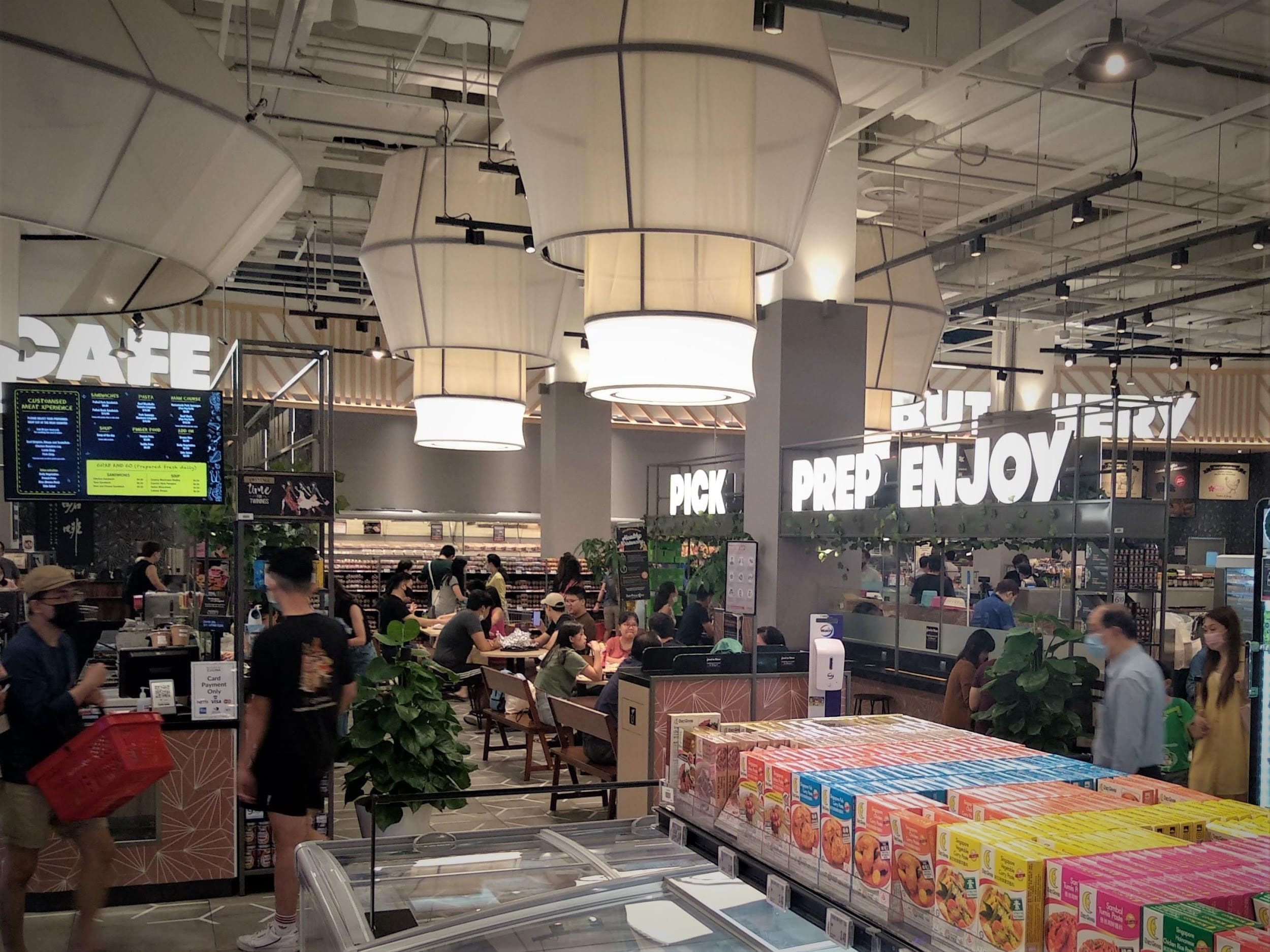Younger consumers are most interested in the pleasure of accessing different food and drink offerings from different restaurants and therefore more than half of under-35s are likely to visit a food hall soon. Here are three potential strategies for foodservice operators to tap into the opportunities that food halls present:
1. Enhancing shopping experiences
Given that supermarkets are one of the chief beneficiaries from the turn to remote working since the start of the pandemic, it makes sense for retailers to set up in-store catering to enhance the shopping experience and increase dwell time, allowing shoppers to add extra items into their shopping basket over a longer period of time.
People’s interest in eating inside of a retail store is largely driven by their desire for a place to refuel while they shop, and therefore almost half of Britons agree that a limited service restaurant (ie. minimal table service) inside a retailer provides shoppers a place to relax in-store.
Singapore’s Fairprice Xtra VivoCity can offer inspiration here. This hypermarket concept combines a supermarket and a food hall, branded The Kitchen. Integrated right into the supermarket shopping area, The Kitchen concept includes a dining area and an open kitchen where chefs prepare and serve freshly cooked meals for shoppers to dine in.
The Kitchen also moves produce from the supermarket to foodservice, delivering a seamless cross-channel experience. For instance, the ingredients bought from the fresh food counters (eg. the butchery) can be cooked at The Kitchen for a cooking fee that is priced according to weight. At the time of writing (October 2021), the cooking fee for the first 400g of ingredients costs S$4 (£3) and S$1 (£0.75) for each additional 100g.
Shoppers who prefer a quick meal at the supermarket are also encouraged to use its dining area to eat grab-and-go foods bought from the supermarket, such as sushi, bento (Japanese lunch boxes) and sandwiches.
The Kitchen at Fairprice Xtra VivoCity (Singapore), 2021
Source: Mintel
2. Cross-category marketing
When Boxpark hosted screenings of the UEFA Euro 2020 matches in its London venues – Shoreditch, Croydon and Wembley – it unlocked the opportunity for food halls to develop meaningful cross-category promotions.
Admittedly, pent-up demand for the long-awaited sporting event allowed Boxpark’s community-driven food hall venues to get a boost from hosting the UEFA Euro 2020 matches.
Euro 2020 at BoxPark
Source: Boxpark
Still, televised fixtures can help foodservice kick off their fightback, as these are most appealing to people who expect to eat in at limited service restaurants (eg. food halls) over the next six months, as 34% of them agree that there should be more food outlets/restaurants that show live sport.
As a collective business model, food halls are poised to adapt their retail mix to stay competitive, as opposed to stand-alone restaurant sites that risk losing out to the leisure sector that is actively rolling out cross-category concepts.
Gravity Wandsworth, for instance, is a new entertainment venue in south-west London that features bars, restaurants, go-karting, tenpin bowling and adventure golf.
Therefore, food hall concepts are focusing on operating a more entertainment-led business model. Manchester’s Escape to Freight Island, for instance, is a food hall that combines a wide range of ethnic cuisines with non-food related entertainment. Its website features a calendar of events that allows people to book tickets to events including family sing-alongs, stand-up comedies and dance parties.
Escape to Freight Island describes themselves as “a place where we can come together again”
Source: Escape to Freight Island
3. Repurposing empty sites
Vacancy rates in shopping centres have risen to an 8-year high, reaching 19.4% in H1 2021, up from 15.6% in H2 2020, according to Local Data Company.*
With landlords grappling with empty retail units, there is an opportunity for these to be transformed into food halls and operators are likely to be in a strong position to secure cheaper rents.
Gravity Wandsworth, for instance, reoccupied the former Debenhams within Southside Wandsworth and transformed the 80,000 sq ft space into an entertainment venue.
Gravity Wandsworth
Source: Gravity
Empty department stores open up opportunities for mixed-use sites with a strong community-driven ethos that brings people together for a day out in a sustainable way.
Another former Debenhams store on Worcester high street, for example, is currently being repurposed into an artisanal food hall by Hammonds of Hull and Artisan Food Hall Limited. The store is expected to feature an artisanal food hall and a community-led farmers market over three or four floors which will also include music, arts and creative spaces.
Both companies were also behind transforming the former House of Fraser department store in Hull into a 60,000 sq ft artisanal food hall in summer 2021.
The HOH Food Hall at Hull created a “vibrant mix of artisanal food halls combining dining, organic grocery, retail food, music and culture” during the summer
Source: HOH Food Hall
*The Local Data Company’s Report on Retail and Leisure Activity Over H1 2021












































